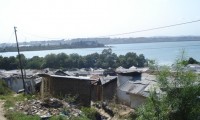Eco-Build Africa provided technical support and guide for development of the African Union Climate Change Strategy, through Prof. Alfred Omenya, between 2009 and 2013. It is an established scientific fact that the earth’s climate is changing due to anthropogenic emissions of green house gases with devastating impacts on all aspects of life. The African Climate Change Paradox: Although Africa is the least contributor to green house gas emissions (approximated at 3.8% at global level), the continent is the most negatively impacted continent by the effects of climate change. This is mainly due to its high levels of vulnerability and low adaptive capacities. The continent relies heavily on climate sensitive sectors for its growth and development. Africa is thus bearing the brunt of climate change, a paradox which threatens its entire development.
In July 2009, the African Union Summit adopted a decision on the African Common Position on Climate Change, which requested the Commission, in collaboration with partners, to elaborate a comprehensive African Strategy on Climate Change.
Key reasons why the continent needed this strategy included:
- To fill up the climate change governance gap, without which responses to climate change will be far from optimal;
- To reduce vulnerability and impacts of climate change in the continent, hence need to integrate climate change into development and to climate proof African economies
- To deal with challenges and to exploit opportunities of climate change, through sharing, transfer and use of knowledge ; technology, and climate change finance;
- To have effective regional and international cooperation and collaboration to deal with climate change.
The strategy is based upon these key reasons and result in four “pillars of action”. They reflect the continental priorities in dealing with climate change and its impacts.
The four pillars are:
- Improvement of Climate Change Governance
- Enhancing Means of Implementation of climate change programmes
- Integration of Climate Change into Development and Climate Proofing of African Economies.
- Promoting Regional and International Cooperation in Climate Change.
The purpose of this strategy is to provide a framework for integrated and coordinated mechanisms which will give strategic direction to member states and other stakeholders in addressing the challenges and opportunities associated with climate change in the continent with the view of improving the livelihoods of the African people and environment they live in.
















